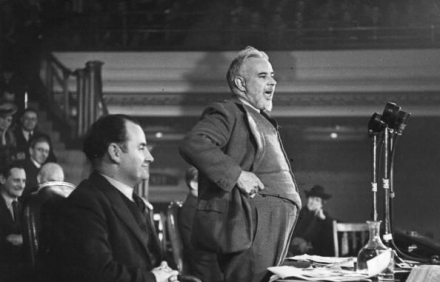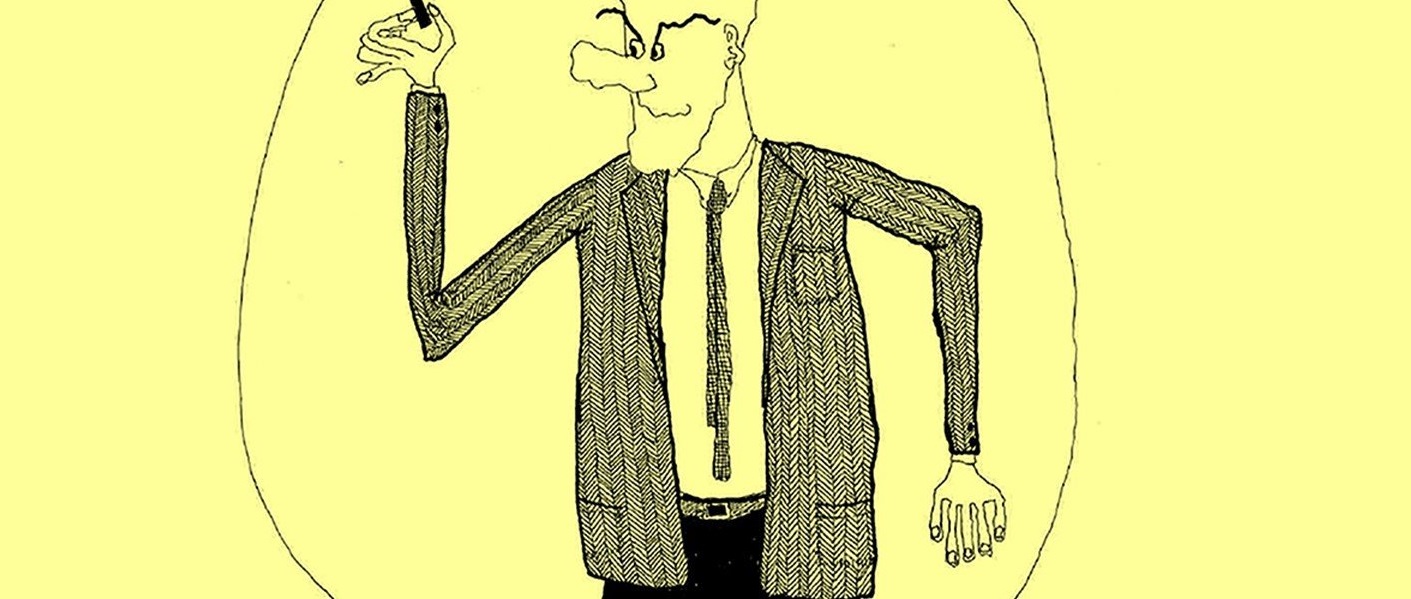‘If he hadn’t existed, a satirical novelist would surely have invented him’ – Nige on the popular philosopher C.E.M Joad…
As well as being a ‘botanophile’ (as he terms it, to distinguish himself from a proper botanist), Jocelyn Brooke was also a keen maker of fireworks, an interest he developed while still at school. Once…
…quite unwittingly, I nearly blew up Professor Joad. I was at Bedales by this time, and had become friendly with Julian Trevelyan, to whom, in the holidays, I sent a parcel of home-made fireworks. Mr Joad, who was staying with the Trevelyans, was detailed, it seems, to ignite one of my maroons. Either Mr Joad was too slow, or the fuse was too short: the maroon, at any rate, exploded with an annihilating report within a few inches of the philosopher’s nose. Had the distance been only slightly less, the BBC might have been a different (and doubtless inferior) institution.
C.E.M. Joad – all but forgotten now – was in his day one of the most famous public intellectuals in a country notoriously suspicious of public intellectuals. And looking at the example of Joad, one can see why. If he hadn’t existed, a satirical novelist would surely have invented him.
A brilliant student (double first from Balliol etc), he moved smoothly (and fashionably) from Syndicalism to Guild Socialism to Fabianism, until he was expelled from the Fabian Society for sexual misbehaviour at a summer school. He entered the Civil Service, bent on infusing it with a socialist ethos, before moving on to Birkbeck College, where he became a great populariser of philosophy and a prolific author.
Along the way Joad had married, settled in the delightful hamlet of Westhumble in Surrey, and fled to Snowdonia at the prospect of conscription (this was the Kaiser War, and Joad was, of course, a convinced pacifist). When the coast was clear, he returned, then a couple of years later left his wife and three children for the first of a long string of mistresses. Sexual desire he regarded as ‘a buzzing bluebottle that needs to be swatted promptly before it distracts a man of intellect from higher things’. He was a firm believer in the all-round uselessness of the female mind, and had no interest in women who (mysteriously resistant to the combined firepower of paunch, pipe and whiskers) wouldn’t go to bed with him.
In the Thirties, Joad effectively won the famous Oxford Union debate on the motion: ‘This house will in no circumstances fight for King and Country’ (this just after Hitler became Chancellor). And he indulged an interest in the supernatural, going on ghost-hunting expeditions with Harry Price, though Joad’s publications in this field were coolly received by the Society for Psychical Research.
With the Hitler War came Joad’s big break, when he talked himself onto the new radio discussion programme The Brains Trust, by means of which he became a national celebrity, famous for his catchphrase ‘It all depends what you mean by…’ Joad hugely enjoyed his fame, but it all ended in scandal – not over his sexual behaviour, but over train tickets. Having foolishly boasted in print that ‘I cheat the railway company whenever I can’, he was shortly thereafter convicted of travelling without a ticket on a train from London to Exeter, fined, and sacked by the BBC. His career as a celebrity philosopher was over, but he still found time to renounce his long-standing agnosticism and return to the bosom of the Church of England before he died.
And now we have to make do with Alain de Botton…











Oh, yes. PG Wodehouse could have made merry with that material. What a thoroughgoing shit the man was. Unfortunately we still have plenty of his like, and even though they now call themselves ‘comedians’, they still imagine themselves to be brilliant philosophers.
A lot of “progressive” intellectuals today seem puzzled and angry that the general population doesn’t recognize their superior intellects and altruism, and that they are surrounded by a dull, conservative lumpenproletariat beholden to shopping and sport and endlessly hoodwinked by Titmuses and misanthropic “neo-liberals”. In many cases, what they consider brilliance is mainly a flair for inhabiting worlds ethereal and juggling abstract concepts they have convinced themselves are concrete (“the biosphere”, “our common humanity”, etc.), which they then use to build a topsy-turvy ideal world. Such is politics in the postmodern age, but the personal moral inversions that their garantuan intellects seem to produce are fairly predictable. Many great 20th century sages (Russell, Wells, Sartre, etc.) left a trail of exploited women and ignored children behind and seem to have inspired whole generations of idealists and iconoclasts. But surely the path from academic brilliance at Oxford to boasting about stealing train tickets to help save the world is the ne plus ultra of modern intellectual pathology. Stranger still is how untroubled they and their disciples can be by this sort of thing. If Joad came back today and was called to account, no doubt he would say, to loud cheers from the back of the courtroom, that it just proved he wasn’t a hypocrite.
As if hypocrisy was such a bad thing in any case – de la Rochefoucauld and all that – whereas being a shit, though lacking in abstraction, is being a shit.
The more you read about “Professor” Joad – who for all his learning was no more a professor than Stanley Unwin or Jimmy ’Whacko’ Edwards – the more baffling his behaviour appears. According to the biography at ‘Find-a Grave’:
Joad had an obsession about trying to defraud the railways, and he used to carry pocketfuls of penny tickets, lie about which station he had boarded the train, and even scramble over hedges and fields to avoid ticket collectors.
As Joad was not poor, you can only surmise that he got some sort of transgressive thrill from the situation – or was it all about demonstrating his superiority to petty rules and the dull clods who follow them?
According to a recent letter in the London Review of Books, it all started very young; when still a boy, Master Joad managed to hurl a spanner into the slowly grinding works of the Oxford English Dictionary, then under the direction of the august Sir James Murray:
As a child, Cyril Joad … was a frequent guest at the Murrays’ house in the Banbury Road. One Sunday in summer 1899 the nine-year-old Cyril came across Murray’s Scriptorum, a large shed-like structure in the garden. Having forced his way in through a window he emptied the ink bottles and paste over the notebooks, pulled down the bookcases, and scattered the slips on which the words and their meanings were written and gummed others together. A whole pile of notes to be entered on the slips by the assistant editors was reduced to an unuseable pulp. Many words were probably lost and there was a delay of months in the publication of the next volume. Murray amazingly forgave the boy, and continued with his promise to his parents to keep an eye on him.
I am still enough of a lexicographer to feel that like a kick in the stomach. Perhaps if Murray had been less forgiving, and Joad had received a proper thrashing, things might have worked out better all round?
It’s also been suggested that Stephen Potter got the inspiration for his great ‘gamesmanship’ series after playing tennis with Joad. Potter was rendered awe-struck and incredulous by his opponent’s mild way of enquiring whether certain balls were in or out, when anyone could see they had landed square in the middle of the court.
Tolkein – an Oxford acquaintance – came up with the obvious nickname: ‘Joad of Joad Hall’.
Jonathan,
I just checked this out in what I think was your source, Elizabeth Murray’s Caught in the Web of Words, and she goes on to say that since the family never mentioned the incident – and certainly would have done had it taken place – it sounds like a fantasy, conjured up by a ‘fat, spoilt small boy’. This is in no way to undermine the horror of the tale, even as a fantasy (and the horror was why I wanted to check it out) or the value of laying it before us. I recall Joad boring on in the 50s, a star of the BBC’s Brains Trust. I understood nothing then, least of all what an appalling figure he appears to have been.
Interesting. The dreadful tale first appeared in Joad’s 1930 memoir The Pleasure of Being Oneself and its truth is accepted by his most recent biographer, Tony Judge (author of the letter to the LRB that I quote). The fact that Elizabeth Murray (Sir James’s granddaughter) disputed Joad’s account is noted in a follow-up letter from Peter Gilliver, an associate editor of the OED who seems to be the project’s unofficial historian. Gilliver quotes Elizabeth’s conclusion: “It was probably what Joad would like to have done, moved by the resentment which he says he felt against the “decorous regularity” of the Murray household.”
Gilliver goes on: “There certainly appears to have been no decline in the productivity of Murray and his fellow lexicographers in 1899: this was the year the annual total number of Dictionary pages published exceeded five hundred for the first time, an achievement they repeated in 1900 and 1901.”
Peter Gilliver is a friend and in fact the dictionary’s official historian. I seem to recall asking him, maybe five years ago, what his deadline was for the book on which he is engaged? ‘2017’ but there was no real hurry.
Good grief – thanks for that Jonathan – the man sounds more and more like a case of Personality Disorder, as they call it these days (or in plain English, a selfish and self-regarding sh1t).